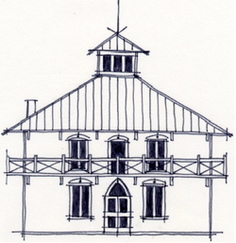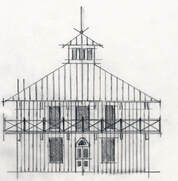
KEY CONSIDERATIONS
What’s the purpose of your project?
Are you preparing your home for sale? Adapting to new life circumstances? Hoping to modernize your space or restore its historic character? Understanding the “why” behind your project helps us align our approach with your vision.
Do you have multiple projects you are trying to tackle?
While it may be less disruptive in the short-run to do them in stages, many jobs are best bundled, ultimately saving time and money. For example, if projects share permits, require wall or ceiling access, or involve costly setup (like scaffolding). We are happy to help you think through timing, sequencing, and cost-efficiency to plan your project wisely.
What is your budget?
High-quality remodeling and building often cost more than expected. We believe in transparency and craftsmanship, so having a clear sense of your budget helps us guide design choices and prioritize effectively from the start.
Have you started selecting materials?
Choosing fixtures, tile, flooring, paint, appliances, and cabinetry is time-consuming, and your choices directly affect both cost and timeline. Keep in mind: “budget” options sometimes come with hidden costs, such as more labor-intensive installation. Well-built materials may cost more up front but can be more efficient—and longer lasting—in the long run.
Are you working with an architect?
If you’ve hired an architect, we’re happy to collaborate. We will help make sure that plans are not only beautiful but also practical and feasible within your space and timeline. If you are still looking for an architect, we can connect you with professionals we have worked with.
Are you ready for temporary disruption?
It is impossible to live in your home during construction/remodeling without some form of disruption to your daily life. For example, how would you be affected by losing a bathroom or your kitchen for a month? Thinking this through now can help you plan ahead and avoid surprises during the project.
What’s your timeline?
From initial consultation to project start can take several months depending on the job. We take time to plan thoroughly, make key decisions with you, and schedule dedicated time to focus fully on your job.
📞Contact Us to get the conversation started.
What’s the purpose of your project?
Are you preparing your home for sale? Adapting to new life circumstances? Hoping to modernize your space or restore its historic character? Understanding the “why” behind your project helps us align our approach with your vision.
Do you have multiple projects you are trying to tackle?
While it may be less disruptive in the short-run to do them in stages, many jobs are best bundled, ultimately saving time and money. For example, if projects share permits, require wall or ceiling access, or involve costly setup (like scaffolding). We are happy to help you think through timing, sequencing, and cost-efficiency to plan your project wisely.
What is your budget?
High-quality remodeling and building often cost more than expected. We believe in transparency and craftsmanship, so having a clear sense of your budget helps us guide design choices and prioritize effectively from the start.
Have you started selecting materials?
Choosing fixtures, tile, flooring, paint, appliances, and cabinetry is time-consuming, and your choices directly affect both cost and timeline. Keep in mind: “budget” options sometimes come with hidden costs, such as more labor-intensive installation. Well-built materials may cost more up front but can be more efficient—and longer lasting—in the long run.
Are you working with an architect?
If you’ve hired an architect, we’re happy to collaborate. We will help make sure that plans are not only beautiful but also practical and feasible within your space and timeline. If you are still looking for an architect, we can connect you with professionals we have worked with.
Are you ready for temporary disruption?
It is impossible to live in your home during construction/remodeling without some form of disruption to your daily life. For example, how would you be affected by losing a bathroom or your kitchen for a month? Thinking this through now can help you plan ahead and avoid surprises during the project.
What’s your timeline?
From initial consultation to project start can take several months depending on the job. We take time to plan thoroughly, make key decisions with you, and schedule dedicated time to focus fully on your job.
📞Contact Us to get the conversation started.

CHOOSING A CONTRACTOR
Look for Relevant Experience
Not all contractors specialize in the same types of work. Be sure they have done projects similar to what you have in mind.
Choose Well-Rounded Skills
A well-rounded contractor has experience working with architects and designers and anticipates the needs of every subcontractor (e.g., framing, plumbing, electrical, painting, tiling, plastering, flooring). This ensures better planning and coordination across trades, reducing delays and costly do-overs.
Hire One Point of Contact
Having one contractor oversee the entire job provides accountability, consistency, and peace of mind. While it might seem cheaper to manage multiple subcontractors yourself, it often leads to, poor coordination, gaps in responsibility, uneven quality, and finger-pointing when something goes wrong.
Ask the Right Questions
Request 1–2 references and ask about:
A Good Contractor is a Partner
The right contractor is a collaborator who helps bring your vision to life while respecting your home, your time, and your budget.
Look for Relevant Experience
Not all contractors specialize in the same types of work. Be sure they have done projects similar to what you have in mind.
Choose Well-Rounded Skills
A well-rounded contractor has experience working with architects and designers and anticipates the needs of every subcontractor (e.g., framing, plumbing, electrical, painting, tiling, plastering, flooring). This ensures better planning and coordination across trades, reducing delays and costly do-overs.
Hire One Point of Contact
Having one contractor oversee the entire job provides accountability, consistency, and peace of mind. While it might seem cheaper to manage multiple subcontractors yourself, it often leads to, poor coordination, gaps in responsibility, uneven quality, and finger-pointing when something goes wrong.
Ask the Right Questions
Request 1–2 references and ask about:
- Quality of craftsmanship
- Timeliness and responsiveness
- Job site cleanliness
- Respectfulness and professionalism
- Subcontractor coordination
- Do you have young children or pets?
- Will you need to stay in the home during construction?
- What precautions will be taken to minimize disruption?
A Good Contractor is a Partner
The right contractor is a collaborator who helps bring your vision to life while respecting your home, your time, and your budget.
